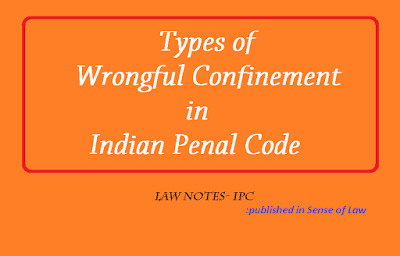[ad_1]
As per Section 340 of IPC whenever a person wrongfully restrains any person in such a manner as to prevent that person from proceeding beyond certain circumscribing limits, it constitutes an offence of wrongful confinement.[exact words not used]
Illustration: If A is locked inside a room by B thereby restraining A’s movement beyond the limits of that room, B has done the offence of wrongful confinement. Here the restraint is not against moving in a particular direction. In this offence, the victim is totally confined.
The elements or essential ingredients of the offence are:
- Wrongful restraint of any person
- The restraint was intended to prevent the victim from proceeding beyond certain limits where he has a right to proceed.
Types of Wrongful Confinement
1. Wrongful confinement for three or more days
Illustration: If A locks B inside a room for 3 or more days so as to prevent him from going outside where he has a right to go, then A is punishable under Section 343 with either simple or rigorous imprisonment for two years or more or with fine or with both.
2. Wrongful confinement for ten or more days
Illustration: If If A locks B inside a room for ten days, or more, then A shall be punished with either simple or rigorous imprisonment up to three years, and shall also be liable to fine as per Section 344 IPC.
3. Wrongful confinement of person for whose liberation writ has been issued
illustration: If A, being a person in charge of a prison locks B in prison even after knowing that an order for his release has been ordered A shall be punished with either simple or rigorous imprisonment for a term which may extend to two years plus to any term of imprisonment to which he may be liable under any other sections relating to wrongful confinement. This is stated under Section 345 IPC. In this case, if A wrongfully confines B to 4 days he will be tried for offences under Section 343 and 345.
4. Wrongful confinement in secret
Illustration: If A wrongfully confines B secretly in a secret place so as to hide from any person interested in such confined person or from any public servant like police personnel then A shall be punished under Section 346 IPC with simple or rigorous imprisonment for a term extending up to 2 years. This punishment will be in addition to any other punishments for wrongful confinement. Suppose if A confines B for ten or more days, then he will be tried for punishment extending up to 2 years in Section 346 plus 3 years as per Section 344 IPC.
The above provision is applicable in cases of unlawful detention. In D.K.Basu vs. State of West Bengal (1997 1 SCC 416), the honourable Supreme Court of India structured appropriate machinery for contemporaneous recording and notification of all cases of arrest and detention to bring in transparency and accountability in police arrests. It was held that the person arrested must be made aware of this right to have someone informed of his arrest or detention as soon he is put under arrest or is detained.
5. Wrongful confinement to extort property, or constrain to an illegal act (Section 347)
Illustration: If A, with an intention of exhorting money, property or valuable security from B or any person interested in him, wrongfully confines B he can be punished under Section 347 IPC. If A has the intention, by confining B, to do anything illegal or to seek from them any information which may facilitate the commission of an offence, then he shall be punished with the above section. The punishment is imprisonment of either description for a term which may extend to three years, and shall also be liable to fine.
6. Wrongful confinement to extort confession, or compel restoration of property (Section 348)
“Whoever wrongfully confines any person for the purpose of extorting from the person confined or any person interested in the person confined any confession or any information which may lead to the detection of an offence or misconduct, or for the purpose of constraining the person confined or any person interested in the person confined to restore or to cause the restoration of any property or valuable security or to satisfy any claim or demand, or to give information which may lead to the restoration of any property or valuable security, shall be punished with imprisonment of either description for a term which may extend to three years, and shall also be liable to fine.”
Thanks for reading this post. This post is a short note regarding the subject. We will try to make it more detailed in the future in our routine revival process. Please stay with us.
Disclaimer: The content of this post is intended to provide a general guide to the subject matter. Specialist advice should be sought about your specific circumstances. To know our detailed Disclaimer, go to this link. You may also enlighten us with corrections and suggestions through our contact form or through comments.
Sharing is Caring. Please share the content. This will inspire us to post more scholarly content in this blog.
To submit scholarly articles on law or law notes visit this link.
Subscribe to our official Telegram Channel here
Join our official WhatsApp Group here
[ad_2]
Source link


